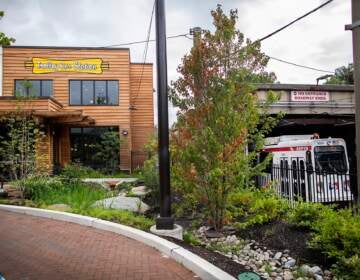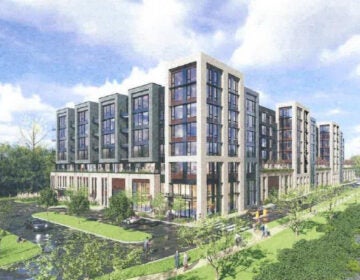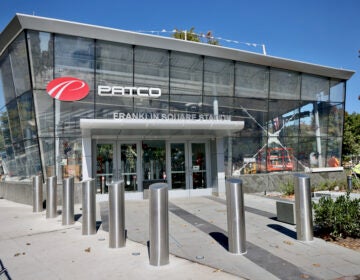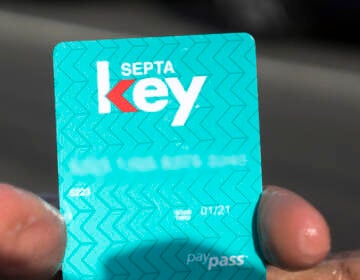West Philly’s Trolley Portal Garden is clear-cut — but officials say plants will return in Sept.
University City District, SEPTA’s partner in the project, says overgrown plants affected trolley drivers’ sightlines. Replanting is set for the fall.
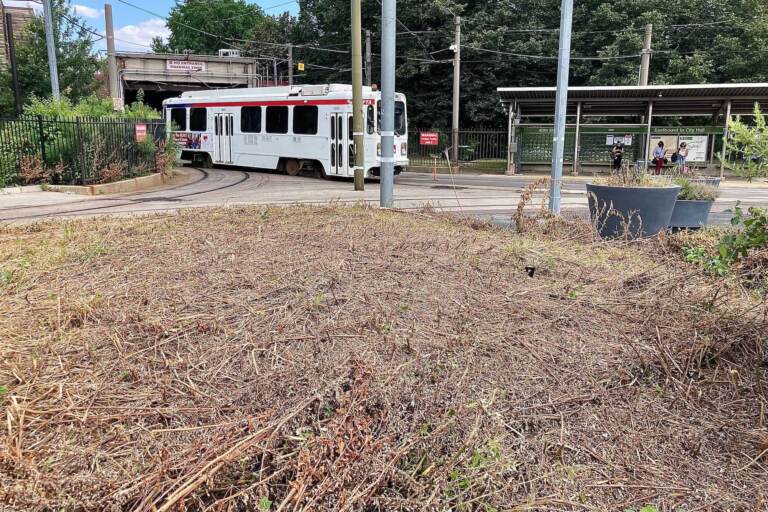
The pollinator garden at the 40th Street trolley portal has been razed. (Emma lee/WHYY)
Some SEPTA trolley riders were incensed after maintenance workers abruptly hacked down a popular wildflower garden at the transit agency’s 40th Street trolley portal in West Philadelphia.
The area, a series of planted mounds and rain gardens, was part of the $2.1 million redevelopment of a largely cement turnaround at the confluence of several trolley lines that service West and Southwest Philadelphia, and included an adjacent cafe. The gardens had been promoted as a national model for sustainable infrastructure since opening in 2018.
But SEPTA riders like Natalie Short were shocked this week to find that years of growth on the mounds and in planters had been clear cut, and the area was now mostly covered with hay.
“I initially thought it was an act of vandalism because it just looked so bad,” Short said. “I thought, ‘Did I just imagine there was a garden there?’”
The transit agency said Thursday that plants at the “Trolley Portal Garden,” as the area is known, were removed as a safety precaution by a partner organization, and that the garden will be replanted in time to bloom next year.
SEPTA spokesperson Andrew Busch explained that the University City District, an economic development agency linked to the University of Pennsylvania and Drexel University, is responsible for maintaining the gardens. During an annual round of trolley tunnel work, the agency determined that “overgrowth” was beginning to “impact the safe movement of trolleys in and out of the tunnel.”
“The UCD made the decision to temporarily clear the greenery in the apron area, reevaluated the planting scheme, and recently announced plans to replant with a new scheme starting in September,” Busch said.
In a statement, the University City District said trolley drivers’ sightlines were affected by the height of the plants, and that the mounds were “attracting vermin.”
“With so many people seeing those … planting areas from trolleys each day, we know how important high-quality, well-maintained landscapes are to the riding public,” the UCD statement reads. “We have reevaluated the planting scheme and will be replanting some of the same plants in a more ordered pattern that will make the space easier to maintain, more visually pleasing, and less likely to repeat the same issues as before.”
UCD said the plantings were removed without the use of chemicals or herbicides, and indicated the garden would be replanted in mid-September and November ahead of the spring growing season.
Still, some like Short said the removal seemed heavy-handed. She described herself as a proponent of “urban habitat gardening” and had admired the wildflower garden as an example of built infrastructure that also fostered native plants, birds, and insects.
“I loved what they did with the trolley portal,” she said. “I hope that if they replant it, that they make sure this doesn’t happen again.”

Subscribe to PlanPhilly
WHYY is your source for fact-based, in-depth journalism and information. As a nonprofit organization, we rely on financial support from readers like you. Please give today.



